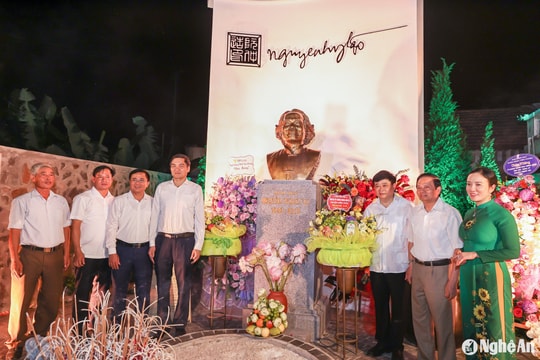Musician Le Ham - left behind many memories
Now, musician Le Ham can no longer see "the moon hanging on the white Quyet mountain peak", can no longer hear "the gentle music of Vinh city lights up", "the sweet voice of the Central region, the love of the homeland", "the singing echoes in the blue sky"...
My uncle Le Ham - musician Le Ham - is no longer here. So from now on, I will no longer receive messages from him: Vinh, go to bed early! Vinh, why are you up so early? It's hot today, Vinh!
Then he encouraged me when he saw me posting beautiful pictures on Facebook. He shared with me his favorite songs, articles, TV shows about him, and small daily joys. Not only me, many people he loved also received such messages. A 90-year-old man, a famous musician... but the youthfulness, modernity, simplicity, rusticity, and affection were always present.
He was intelligent and perceptive, so talking to him was extremely interesting. Every time I met him, I always left with a feeling of gratitude, because somewhere in each sentence, each word, each fragment of memory of that musician, something like the happiness of being alive, and of being able to live in the warmest and most intimate place, kept creeping in and permeating my soul without me even realizing it.
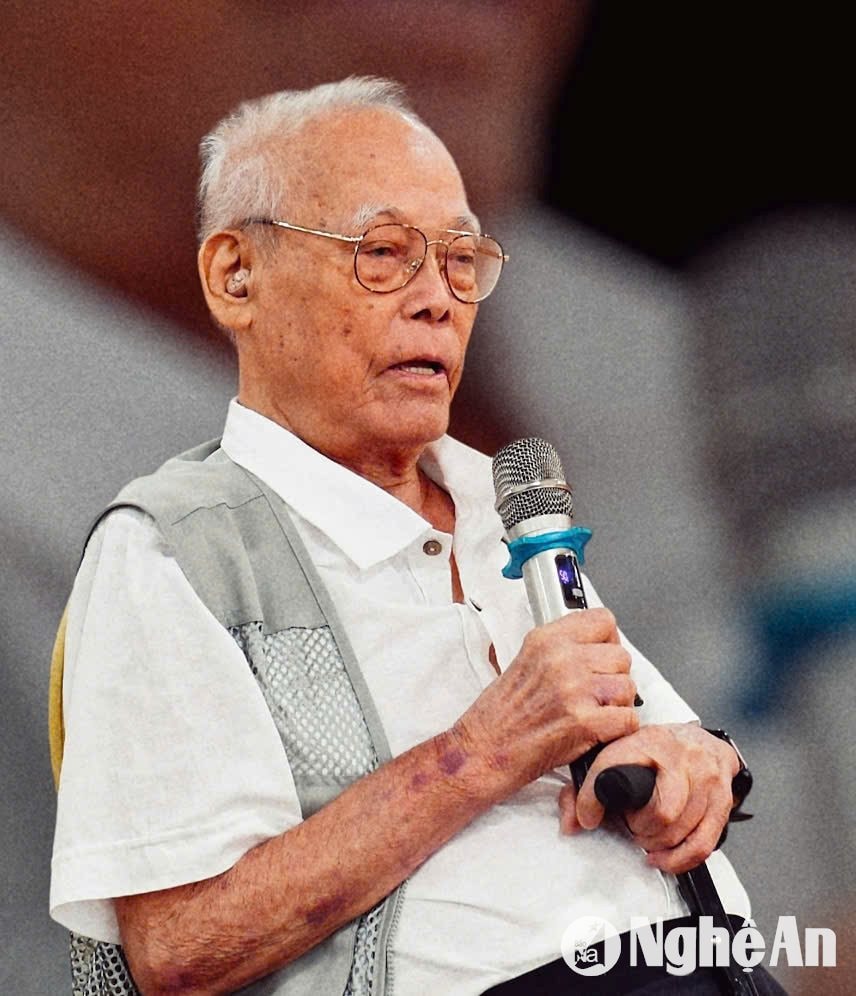
I remember clearly his bright smile during our meetings, whether he was healthy or in the hospital. The story, though mentioning a thousand things, always led back to music. To the small hamlet of Dien Hong commune, Dien Chau, when little Ham, at the age of five or three, sobbed listening to his mother play Kieu. To the makeshift stage of the hamlet's art troupe. To the flute made from papaya leaf stems that little Ham always carried with him. Perhaps it was that first, simple, rustic musical instrument that led musician Le Ham's soul through the days of his life with music, so that it did not stop at passion, music became his career. To the pride of his son who followed his father's footsteps, becoming a musician - Head of the Military Region 4 Art Troupe, who spent his entire childhood rolling around with his parents performing and sleeping soundly on the stage floor...
From his initial passion for his mother's singing of Kieu, for the melodies of the neighborhood's performing arts team, for the clear, crisp, yet simple and familiar sounds emitted from his homemade flute, Le Ham gradually entered the path of professional music. In 1948, Le Ham joined the Inter-Zone 4 Youth Military School and later became an artist of the Inter-Zone 4 Army. In 1951, he entered the Inter-Zone 4 Cultural Department and continued studying at the Composition Department, Vietnam Conservatory of Music. The years of studying and working in the musical environment were important stepping stones, helping him develop his composition techniques and enrich his musical language.
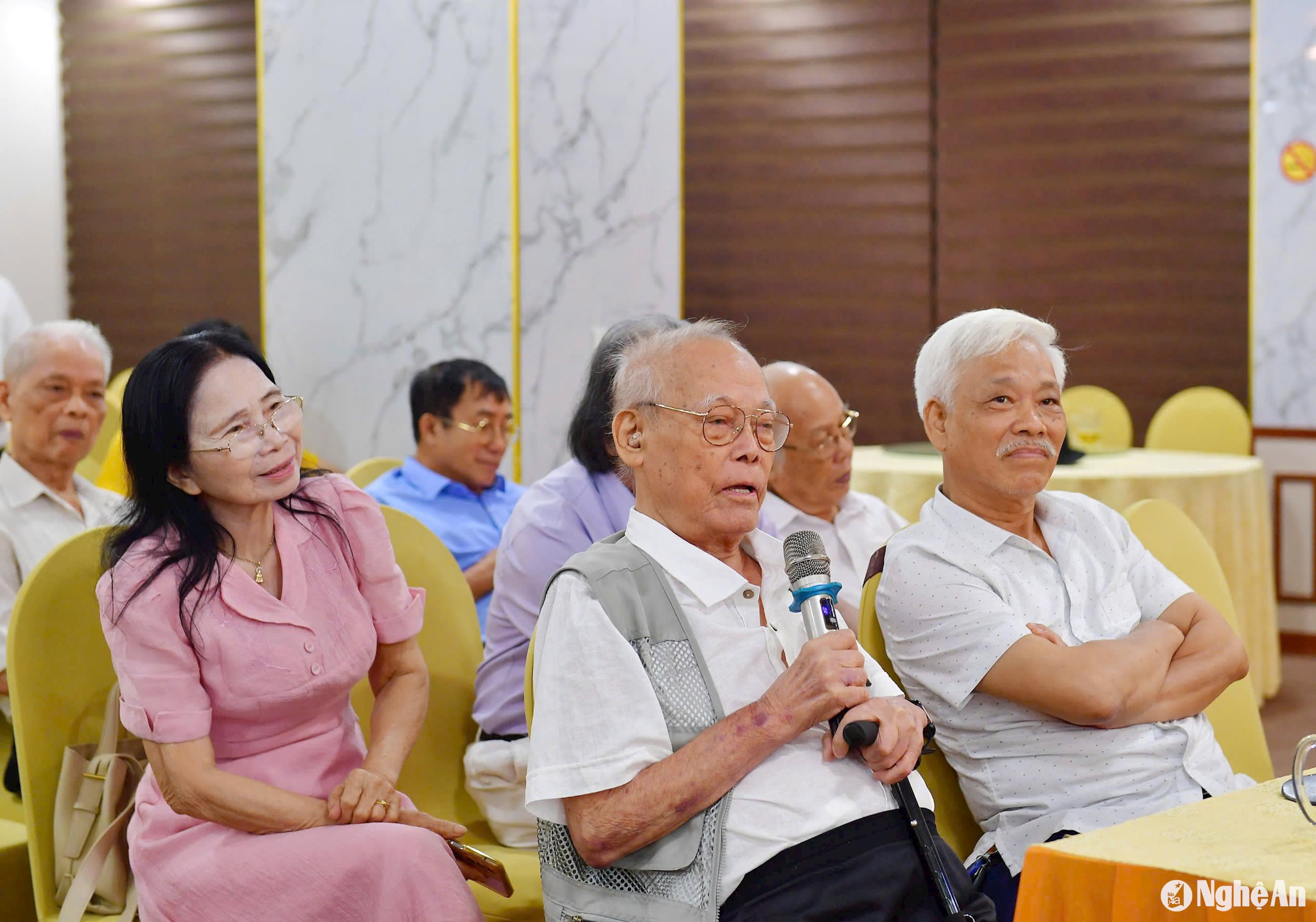
In a career of more than 70 years, Le Ham wrote more than 200 songs, notably: "Nguoi Me Lang Sen", "Gai Song La", "Vinh - Thanh Pho Binh Minh", and many other songs that have become valuable musical heritages of Vietnam and Nghe An. "Vinh - Thanh Pho Binh Minh" is not only the theme song of Vinh City Radio Station but also a symbol of the city's pride and revival after the war.
He told me: “Vinh is a young city, a city under construction, that dawn is the beginning of a new journey, hopefully Vinh will also rise as brightly as the dawn”. That is the reason he named his song “Vinh - the city of dawn”. The inspiration for the composition was a poetic memory with a young female volunteer he accidentally met on the way cycling from Ha Tinh to Vinh. She asked for a ride:“Where are you going? To my hometown Thanh Vinh?”He nodded. Sitting behind her, she chattered on and on, telling stories about her hometown and asking him questions. When they passed Ben Thuy, she stopped to turn into the road to her house, then said goodbye:"Goodbye, remember I will pick you up to go back to Thanh Vinh tomorrow."
That private memory of that warm greeting helped him write the first melody of the song:“I welcome you back to my hometown Vinh/ Listen to the sea breeze lull the Lam River gently/ Relatives and friends live happily together in love/ Here are the city squares at dawn/ The affectionate songs of a girl from Vinh...”.
Along with that story, the images of a fierce war, a devastated Vinh city, the city's children standing on the ruins to rebuild their homeland, the images of soldiers in green and red loincloths marching in unison to the sound of trumpets that Le Ham saw in the old days following his mother's hard-working wholesale fabric stall at the left gate of Vinh city..., all became the inspiration for him to write "Vinh - city of dawn".
In addition to this work, he also has many songs about Vinh such as “From the Red City, we set out”, “Lovely Vinh City”… Written about Nghe An with so much affection, one of the other outstanding works is “The Mother of Sen Village”, a song that has touched the hearts of many generations. The song not only praises the merits of Vietnamese mothers but also reflects the musician’s respect and deep affection for President Ho Chi Minh and his homeland. Le Ham used music to capture the great but simple image of a mother, with simple but meaningful verses.
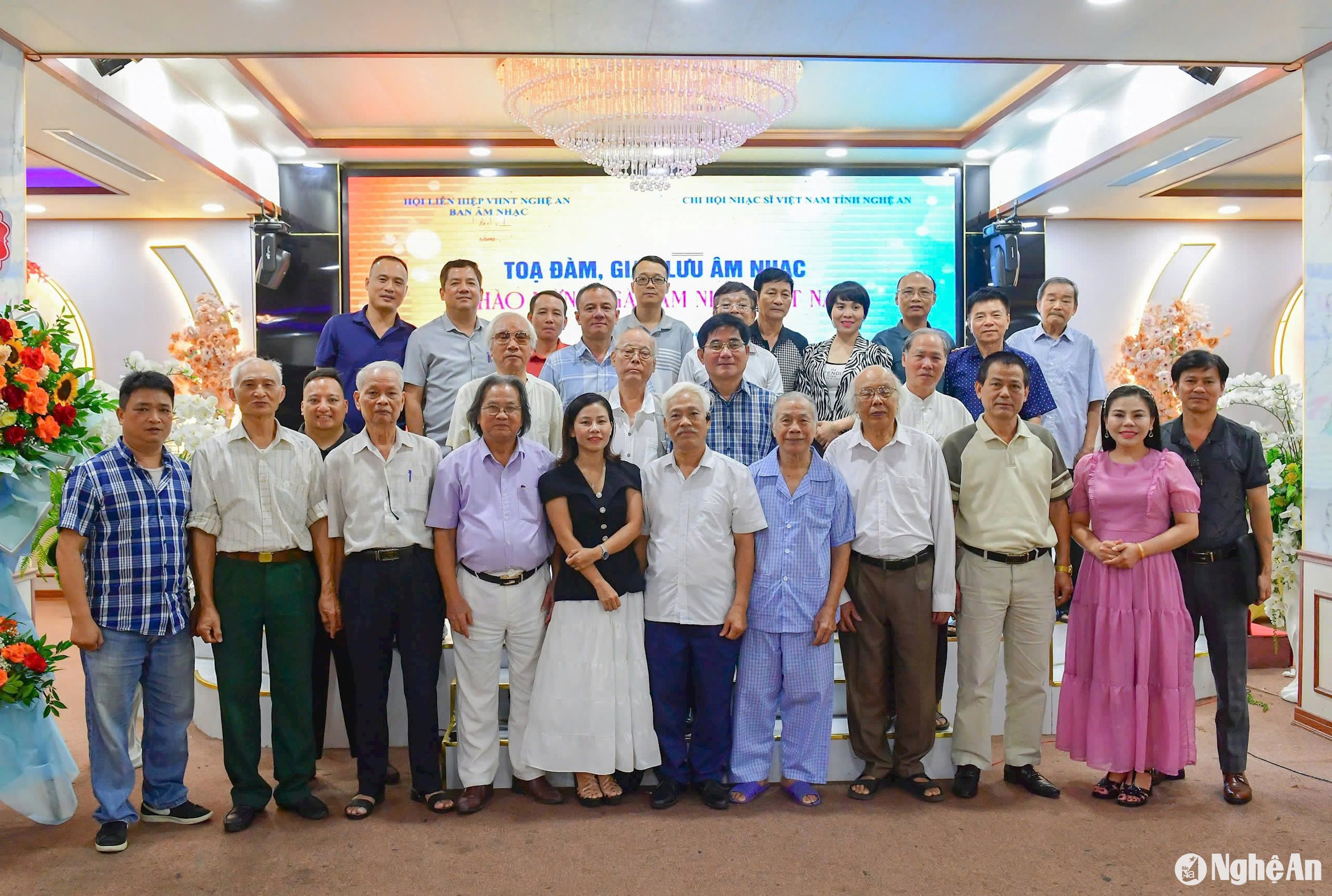
Musician Le Ham was also a “cultural soldier” during the war, witnessing many hardships on the front lines against the enemy. He served our soldiers at the Vinh Linh border, the northern bank of the Ben Hai River, and then conducted the orchestra of the Ha Tinh People's Art Troupe during the most fierce years of the war. He performed on temporary stages after the enemy's bombs and bullets. The sounds of music and singing echoed on the battlefields filled with smoke. Experience from those days gave him a deep insight into the power of music in motivating soldiers and people.
Many of his songs were born from these experiences, such as “Gai Song La”, “Chien Cong Ha Tinh Vang Vang” and “Nhung Nguoi Chien Si Ben Phe”, which became a source of inspiration for many generations in the struggle for independence and freedom. The song “Gai Song La” brought tears to his eyes when he heard it again on the Voice of Vietnam. The whole nation, from the poorest people to the young mothers who were still holding their babies and trying to lull them to sleep, took off their milk-scented shirts to clear the road for our vehicles to pass with the desire for a day of total victory.
Le Ham is not only famous for his rich musical works but also for his passion for preserving and promoting folk cultural heritage. He spent a lot of time researching and collecting folk melodies of Nghe An, but it is worth noting that he did not just stop at preserving them but also innovated and developed them in a modern style. As he once shared, being too attached to traditional melodies without developing them can make the work monotonous and no longer attractive. Therefore, in his compositions, although he rarely uses Vi and Giam materials, they still maintain freshness and depth, reflecting the spirit of innovation and creativity in music.
He has been honored with many prestigious awards, including the 2022 State Prize for his series of works: "The Mother of Sen Village", "The Girl of La River", and "Vietnam in Our Heart". These awards are not only a recognition of his talent and dedication, but also a testament to the lasting influence of the musical works he has created.
I remember the time I heard that he had won the State Prize, the musician was in the hospital. Leaders of the Nghe An Literature and Arts Association and Song Lam Magazine came to the hospital to visit and congratulate him. When they arrived at the hospital room, the musician sat up, smiled, received flowers, and enthusiastically told stories, thanked him, and asked to take a photo with him. The oxygen mask was still on his face. But he said: No problem, still very happy, just take a photo!

Now, musician Le Ham can no longer see “the moon hanging on the white Quyet mountain peak”, can no longer hear “the gentle music of Vinh city lights up”, “the sweet voice of the Central region with the affection of the homeland”, “the singing echoes in the blue sky”. Now, on the doorstep of the small house in Truong Thi ward, he will no longer welcome me with a bright smile. There are no more times when he leans on his cane to go to the Provincial Literature and Arts Association “because he misses the children” and comes to remember the happy and sad times in this place. There are no more messages “Vinh, go to bed early”, “It’s hot today, Vinh”… But I know, not only on Vinh City Radio, but somewhere between the murmuring waves of the Lam River, between the scorching Lao wind, between the noisy city, somewhere in the hearts of his friends, colleagues and Vinh people, and even people from other places who love Le Ham, the melodies written about Vinh, about Nghe An, about the country and people of Vietnam are still being sung. I know that music can break the limits imposed by the short life of a human being. And therefore, the lyrics and melodies of musicians who are deeply attached to their homeland and country like him will last through the years, will forever be “pure white”, “echoing”, and will forever shine like “the sun shining at dawn”.
Musician Le Ham, pen name La Ky An, Lam Ha. Born in 1934, hometown Dien Hong commune, Dien Chau, Nghe An. He graduated from the Composition Department of Hanoi Conservatory of Music. Musician Le Ham has many contributions to contemporary Nghe An music. He is the author of many famous songs: "Tieng hat dem trang" (1956); "Gai song La"; "Vinh thanh pho binh minh" (1979); "Nguoi me lang sen" (1990)...
He was the Head of the Nghe Tinh Performing Arts Troupe, Deputy Secretary General of the Nghe Tinh Literature and Arts Association, Director of the Labor Culture House, Vice President of the Nghe An Literature and Arts Association, Deputy Secretary General of the Nghe An Folk Arts Association, and Head of the Thanh - Nghe - Tinh Musicians Association.
Musician Le Ham passed away at 7:00 p.m. on September 18 at his home, at the age of 90.

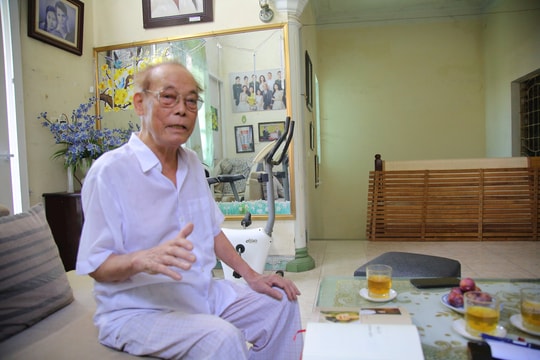

.jpg)
